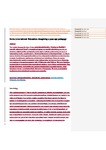Intra-generational education: Imagining a post-age pedagogy
| dc.contributor.author | Haynes, Joanna | |
| dc.contributor.author | Murris, K | |
| dc.date.accessioned | 2017-04-27T16:31:29Z | |
| dc.date.available | 2017-04-27T16:31:29Z | |
| dc.date.issued | 2016-12-01 | |
| dc.identifier.issn | 0013-1857 | |
| dc.identifier.issn | 1469-5812 | |
| dc.identifier.uri | http://hdl.handle.net/10026.1/9155 | |
| dc.description | peerreview_statement: The publishing and review policy for this title is described in its Aims & Scope. aims_and_scope_url: http://www.tandfonline.com/action/journalInformation?show=aimsScope&journalCode=rept20 | |
| dc.description.abstract |
This article discusses the idea of intra-generational education. Drawing on Braidotti’s nomadic subject and Barad’s conception of agency, we consider what intra-generational education might look like ontologically, in the light of critical posthumanism, in terms of natureculture world, nomadism and a vibrant indeterminacy of knowing subjects. In order to explore the idea of intra-generationalism and its pedagogical implications, we introduce four concepts: homelessness, agelessness, playfulness and wakefulness. These may appear improbable in the context of education policy-making today, but they are born of theorising our practices in the age-transgressive field of Philosophy with Children. We argue that these concepts help to reconfigure intra-generational relations, ways of being and becoming. They express the longing, corporeality and visionary epistemology of nomadic enquiry. These inventions express a non-hierarchical philosophy of immanence. We draw some tentative conclusions about educational practices more generally. | |
| dc.format.extent | 971-983 | |
| dc.language | en | |
| dc.language.iso | en | |
| dc.publisher | Informa UK Limited | |
| dc.subject | Intra-generationalism | |
| dc.subject | picturebooks | |
| dc.subject | posthumanism | |
| dc.subject | post-age pedagogy | |
| dc.subject | Philosophy for Children | |
| dc.title | Intra-generational education: Imagining a post-age pedagogy | |
| dc.type | journal-article | |
| dc.type | Journal Article | |
| plymouth.author-url | https://www.webofscience.com/api/gateway?GWVersion=2&SrcApp=PARTNER_APP&SrcAuth=LinksAMR&KeyUT=WOS:000406633200004&DestLinkType=FullRecord&DestApp=ALL_WOS&UsrCustomerID=11bb513d99f797142bcfeffcc58ea008 | |
| plymouth.issue | 10 | |
| plymouth.volume | 49 | |
| plymouth.publication-status | Published | |
| plymouth.journal | Educational Philosophy and Theory | |
| dc.identifier.doi | 10.1080/00131857.2016.1255171 | |
| plymouth.organisational-group | /Plymouth | |
| plymouth.organisational-group | /Plymouth/Faculty of Arts, Humanities and Business | |
| plymouth.organisational-group | /Plymouth/Faculty of Arts, Humanities and Business/Plymouth Institute of Education | |
| plymouth.organisational-group | /Plymouth/REF 2021 Researchers by UoA | |
| plymouth.organisational-group | /Plymouth/REF 2021 Researchers by UoA/UoA23 Education | |
| plymouth.organisational-group | /Plymouth/Research Groups | |
| plymouth.organisational-group | /Plymouth/Research Groups/Institute of Health and Community | |
| plymouth.organisational-group | /Plymouth/Users by role | |
| plymouth.organisational-group | /Plymouth/Users by role/Academics | |
| dcterms.dateAccepted | 2016-10-27 | |
| dc.rights.embargodate | 2018-6-1 | |
| dc.identifier.eissn | 1469-5812 | |
| dc.rights.embargoperiod | Not known | |
| rioxxterms.versionofrecord | 10.1080/00131857.2016.1255171 | |
| rioxxterms.licenseref.uri | http://www.rioxx.net/licenses/all-rights-reserved | |
| rioxxterms.licenseref.startdate | 2016-12-01 | |
| rioxxterms.type | Journal Article/Review |


